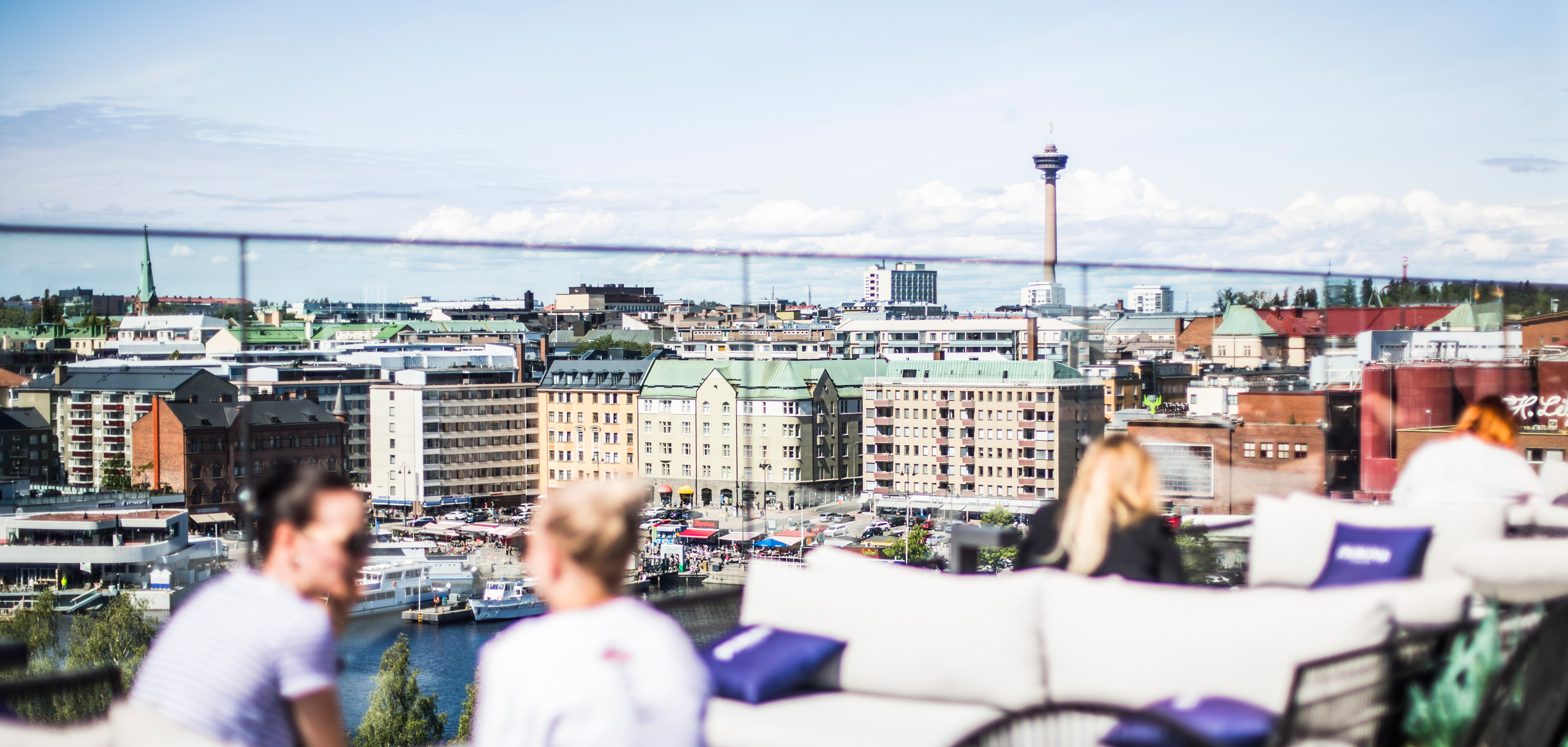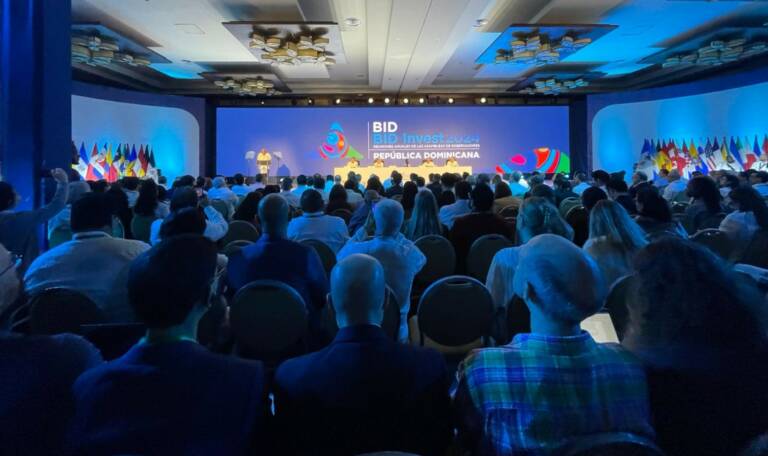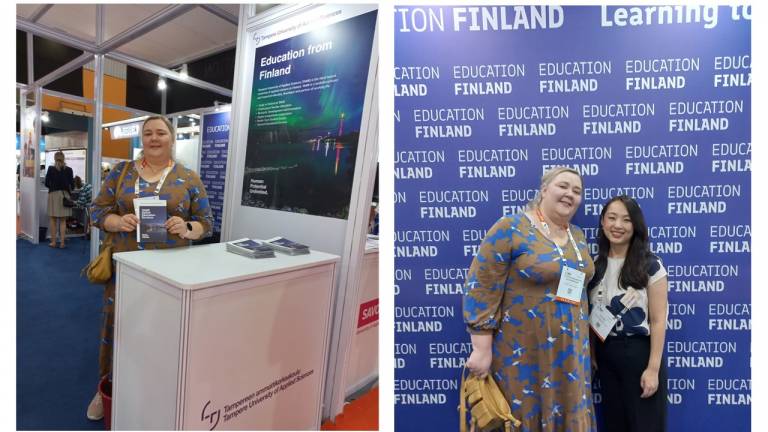Walking through the halls and corridors from one stand to another, searching and investigating information on the latest technological novelties and R&D trends, networking with companies and institutions – searching information means asking questions and discussing. Many of the exhibitors had started to plan their stand and their exhibition months or even one or two years earlier. Building the stand may take several days or more – depending on whether you have whole production lines, equipment, or products to show or whether you rely on posters, videos, and experts to tell the story of your company. It is highly appreciable how well people endure endless discussions and questions on their stands from day to day.
Thanks to the Erasmus funding and the ongoing project funding of the Innovation and competence ecosystem in the Tampere region for sustainable and smart textiles the internationalization aspects of the projects and the development of the education competencies were strengthened with networking contacts and knowledge sharing. Unexpectedly me and my laboratory engineer colleague had the opportunity to visit the TechTextil2022 trade fair in Frankfurt, Germany. A few months later in October 2022 another smaller trade fair, The Swedish Textile Machine Expo 2022 in Borås, Sweden had three visitors from TUAS Finland – now our senior lecturer for textiles accompanying our travel team.
The aim of the travels was to learn more about the latest R&D activities, and test equipment used for recycled textiles as well as technical and smart textile applications for the new Textile and Material Engineering Bachelor Degree Programme, for enlarging activities to adult education and for the Sustainable Smart Textiles project. This helps to develop new textile and material engineering education by building its educational contents with the latest trends in technical textiles, laboratory equipment, sustainability, and smart textiles. Networking with companies and other experts is important for future cooperation activities in education and projects. This was achieved by contacting company experts, institutions, universities, and other higher education experts on the stands. There the primary tool was discussing and collecting information on the latest technological and sustainable trends in technical textiles, materials, test and laboratory equipment, machines used in producing textiles, automation, robotics, smart textiles, and digitalization.
The professional development of the staff member will be the latest knowledge gained on the development of technical textiles, smart textiles, sustainability, R&D, the level of automation in the textile industry, and the new contacts of experts in this field. This will foster international cooperation within education and projects and this will help to build up the educational contents of the new bachelor programme for textiles.


TechTextil is one of the largest trade fairs in the world in the textile business. Last year they gathered 2300 exhibitors, visitors were about 63000, and 117 nations were represented there. Parallel happenings were Texprocess for garment and textile manufacturing process and Heimtextil for interior textiles as well as seminars on several spots. The whole range of technical textiles, functional clothing textiles, and textile technologies were there.
The Swedish Textile Machine Expo 2022 in Borås concentrated on sustainable future textile production. It represented the whole value chain of textile production machines. It covered ca. 50 registered exhibitors on four floors of the campus in the laboratories and halls. Parallel there was a series of several presentations
giving a deeper insight into the products and technologies of the companies. Rieter`s presentation analyzed the short fibre content of mechanically recycled post-consumer cotton waste and showed their classification scheme for recycled fibre. This is critical information for yarn spinners. Textechno showed their test equipment to analyze fibre length that is suitable for recycled fibres. TEKO the Swedish textile and fashion company had their sustainable production seminar at the same time there. Picanol presented there their web-based data-driven production solutions for optimizing energy consumption or even the efficiency of individual machines. We visited also polymer and textile technology laboratories and discussed the cooperation with sustainable and smart textiles project. Smart Textiles Showroom had a large range of concrete commercial smart materials for inspiration and new textile fiber innovation products made of recycled jeans (Circulose®) or Swedish paper. However, the challenge always is how to share your time there whether to discuss with the experts on the stands or listen to the presentations. Therefore you need to make a preliminary plan for your stay to get the most out of it.
The benefit of attending these kinds of trade fairs is that there are most of the people involved with the textile sector at the same time ready for networking. You have the possibility to discuss more deeply the latest technological achievements with the experts of the companies and organizations. You are able to get an overview of the branch, and the important international players on the ground, make notes, study their webpages, and come back later if you find something interesting. There you can see the real products, learn and perhaps even do experiments with the new equipment and you may have the opportunity to touch and feel the materials – which is actually very important for us textile
experts. Interesting about the project is that modern production techniques and digitalization will bring more flexibility for small series and mass customization. Applicable interesting technologies might be adding substances for polymer blends, combining different textile structures and yarns using modern knitting and weaving machines, determining the electrical conductivity of textiles, and laminating components onto textiles. Co-operation with the University of Borås will bring international networks, knowledge of the ongoing research, and new partners.
Authors & photos:
- Project engineer Minna Varheenmaa shared an interest in the sustainability of textiles and processes, smart textiles applications, textile machines and test equipment, digitalization, and robotics in both trade fairs.
- Laboratory engineer Maria Änkö concentrated on test equipment and textile machinery.
- Senior lecturer Marja Rissanen concentrated on test equipment and textile machinery in regard to fibre processing and sustainability of textiles.
Main image: Jonne Renvall





